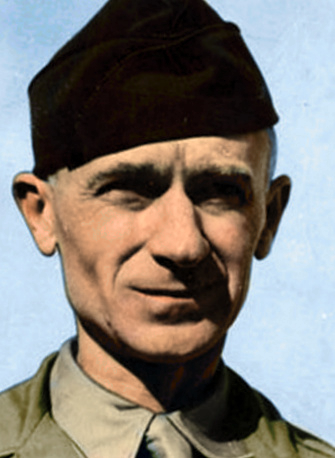The Pittsburgh Press (June 30, 1944)

Roving Reporter
By Ernie Pyle
Normandy, France – (by wireless)
One of the most vital responsibilities during these opening weeks of our war on the continent of Europe has been the protection of our unloading beaches and ports.
For over and through them must pass, without interruption, and in great masses, our building of men and material in sufficient masses to roll the Germans clear back out of France.
Nothing must be allowed to interfere with that unloading. Everything we can lay our hands on is thrown into the guarding of those beaches and ports. Allied ground troops police them from the land side. Our two navies protect them from sneak attacks by sea. Our great air supremacy makes daytime air assaults rare and costly.
It is only at night that the Germans have a chance. They do keep peeking away at us with night bombers, but their main success in this so far has been in keeping us awake and making us dig out foxholes deeper.
The job of protecting the beaches at night has been given over to the anti-aircraft artillery, or ack-ack. I read recently that we have here on the beachhead the greatest concentration of anti-aircraft guns ever assembled in an equivalent space. After three solid weeks of being kept awake all night long by guns, and having to snatch your little sleep in odd moments during the daytime, that is not hard to believe.
Here on the beachhead the falling flak becomes a real menace – one of the few times I’ve known that to happen in this war. Every night for weeks, pieces of exploded shells have come whizzing to earth within 50 yards of my tent. One an unexploded ack-ack shell buried itself half a stone’s throw from my tent.
A good portion of our Army on the beachhead now sleeps all night in foxholes, and some of the troops have swung over to the Anzio beachhead custom of building dugouts in order to be safe from falling flak.
For a long time, I have intended doing a series about the anti-aircraft gunners. I’m glad I never got around to it before, for here on the Normandy beachhead our ack-ack seems to have reached its peak.
Figures are not permission but I can say that right now we have many, many ack-ack soldiers on the beachhead and that by the time everything has arrived the number will be much larger.
And that is speaking only of ack-ack men who do nothing else. In addition there are thousands of gunners attached to divisions and other units who double in brass when planes come over and shoot at anything that passes low.
Our ack-ack is commanded by a general officer, which indicates how important it is. His hundreds of gun batteries even intercept planes before they near the beaches. The gun positions are plotted on a big wall map in his command tent, just as the battlelines are plotted by infantry units. A daily score is kept of the planes shot down – confirmed ones and probables. Just as an example of the effectiveness of our ack-ack, one four-gun battery alone shot down 15 planes in the first two weeks.
Up to the time this is written, the Germans don’t seem to have made up their minds exactly what they are trying to do in the air, they wander around all night long, usually in singles but sometimes in numbers, but they don’t do a great deal of bombing. Most of them turn away at the first great burst from one of our 90mm guns. Our ack-ack men say they think the German pilots are yellow, but having seen the quality of German fighting for nearly two years now that is hard for me to believe.
Often they drop flares that will light up the whole beach area, and then fail to follow through by the light of their flares. The ack-ack men say that no more than two out of ten planes that approach the beachhead ever make their bomb runs over our shipping. You are liable to get a bomb anywhere along the coastal area, for many of the Germans apparently just salvo their bombs and hightail home.
It is indeed a spectacle to watch the anti-aircraft fire when the Germans actually get over the beach area. All the machine guns on the ships lying off the beaches cut loose with their red tracer bullets, and those on shore do too, their bullets arch in all direction and fuse into a sky-filling pattern. The lines of tracers bend and wave and seem like streams of red water from hoses. The whole thing becomes a gigantic, animated fountain of red in the black sky. And above all this are the split-second golden flashes of big gun shells as they explode high up toward the stars.
The noise is terrific. Sometimes low clouds catch the crack of these many guns and scramble them all into one gigantic roar which rolls and thunders like the bloodcurdling approach of a hurricane.
Your tent walls puff from the concussion of the guns and bombs, and the earth trembles and shakes. If you’re sleeping in a foxhole, little clouds of dirt come rolling down upon you.
When the planes are really close and the guns are pounding out a mania of sound, you put your steel helmet in bed and sometimes you drop off to sleep with it on and wake up with it on the morning and feel very foolish.
